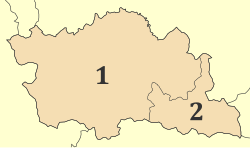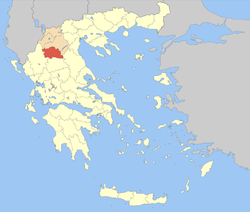Top Qs
Timeline
Chat
Perspective
Grevena (regional unit)
Regional unit in Macedonia, Greece From Wikipedia, the free encyclopedia
Remove ads
Grevena (Greek: Περιφερειακή Ενότητα Γρεβενών, Perifereiakí Enótita Grevenón) is one of the regional units of Greece. It is part of the region of Western Macedonia. Its capital is the town of Grevena.[2]
Remove ads
Geography
Grevena borders the regional units of Ioannina (Epirus) to the west, Kastoria to the northwest, Kozani to the north and east, Larissa to the southeast and Trikala to the south.
The Pindus mountains cover the western part of the regional unit. Other mountain ranges are Chasia in the south and Vourinos in the northeast. The longest river is Aliakmon which flows in the north and the east.[2]
Administration
The regional unit Grevena is subdivided into 2 municipalities. These are (number as in the map in the infobox):[3]
Prefecture
Grevena was created as a prefecture (Greek: Νομός Γρεβενών) in 1964, out of parts of the prefectures of Kozani and Larissa. As a part of the 2011 Kallikratis government reform, the regional unit Grevena was created out of the former prefecture Grevena. The prefecture had the same territory as the present regional unit. At the same time, the municipalities were reorganised, according to the table below.[3]
Remove ads
Economy
The region's economy relies on farming and agriculture. Wheat and legume crops (mostly chickpeas) cover most of the cultivated areas. Livestock production (including goat and lamb) is also strong. An increasing portion of the farming output is produced under organic farming or low input practices. Other main sources of income include ecotourism, forest industry and the ski resort of Vasilitsa, which is a popular destination for winter holidays.
Transport
- Greek National Road 15, S, Cen., N
- Greek National Road 26, SE
- Via Egnatia (motorway)/E90, SW, Cen., NE
Demography
At the 2001 Greek census, Grevena was the least densely populated prefecture in Greece. Grevena has one of the highest rates of population decline in Greece. In 2006, there were 225 births (urban areas-160, semiurban-28 & rural -37) and 393 deaths (urban-96, semiurban-42 and rural-255). In rural areas, death rate was about 7 times the birth rate.[4]
Archaeology
The regional unit of Grevena is rich in archaeological sites that were discovered along the years.[2]
See also
References
Wikiwand - on
Seamless Wikipedia browsing. On steroids.
Remove ads



